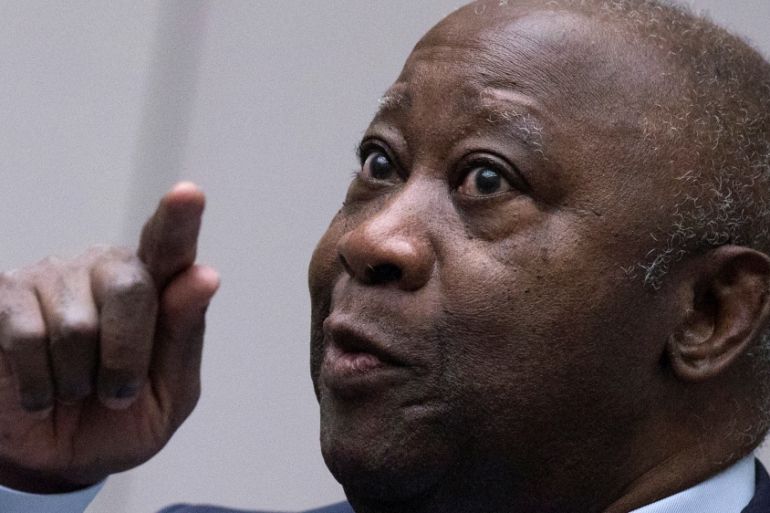ICC orders conditional release of Ivory Coast’s Gbagbo
Ex-leader stood trial for murder, rape, persecution and other inhumane acts committed in 2010’s post-election violence.

The International Criminal Court (ICC) has ordered the conditional release of former Ivory Coast President Laurent Gbagbo after he was cleared of charges of crimes against humanity last month.
Judges agreed on Friday to release the 73-year-old former strongman and his aide Charles Ble Goude on condition that they live in an as-yet-unspecified country pending an appeal by the prosecution.
Keep reading
list of 4 itemsCan international justice stop Israel?
What will be the outcome of the ICJ genocide case against Israel?
Is Israel committing genocide in Gaza?
Gbagbo and Ble Goude stood trial on four counts of crimes against humanity for murder, rape, persecution and other inhumane acts committed by pro-Gbagbo forces in the aftermath of the disputed 2010 polls.
Gbago has been in ICC custody since 2011, Ble Goude since 2014.
Appeals judge Chile Eboe-Osuji said the court would release them “to a state willing to accept them on its territory and willing to enforce the conditions set” by the court.
Ivory Coast is an ICC member state, but the court may be unwilling to send Gbagbo to his homeland, given that it has refused to surrender Gbagbo’s wife Simone despite an outstanding ICC warrant for her arrest.
Gbagbo had been kept in detention pending objections by prosecutors, who plan to appeal the acquittal and sought guarantees that the men would return to court later if required.
Lawyers previously cited the arrangement reached with former Democratic Republic of the Congo vice president and rebel leader Jean-Pierre Bemba, who went to Belgium after he was cleared by the ICC last year.
Bemba was acquitted on appeal for crimes allegedly committed by his militia in the Central African Republic in 2002-2003.
Bemba was later convicted of tampering with witnesses but did not have to return to serve time in jail because of previous time served.
The court ordered officials to make “appropriate interim arrangements” to find somewhere for Gbagbo to stay until a final agreement is made with whichever country hosts him.
Thousands killed
The first former head of state to stand trial in The Hague, Gbagbo was found not guilty on January 15 for the 2010 wave of violence.
More than 3,000 people died on both sides after Gbagbo refused to concede defeat to his internationally backed-rival, Alassane Ouattara, who is Ivory Coast’s current president.
|
|
The ICC was set up in 2002 for trials relating to war crimes and crimes against humanity. So far, most of its cases have involved African countries.
Previous ICC attempts to try top politicians for crimes committed by subordinates or followers have all run into serious difficulties.
In 2014, the ICC’s chief prosecutor, Fatou Bensouda, dropped crimes against humanity charges against Kenyan President Uhuru Kenyatta.